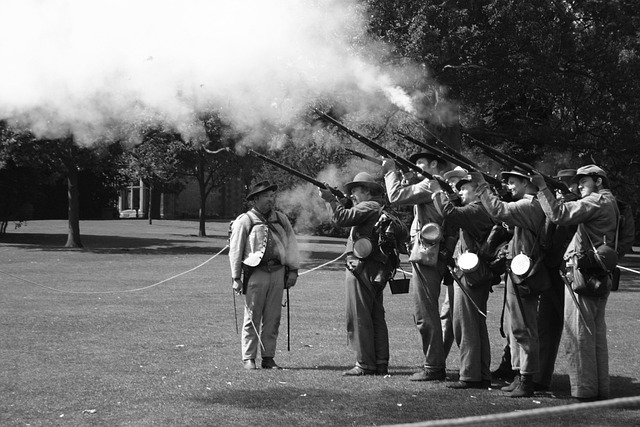The Confederate States of America was a group of 11 southern states that seceded from the United States in 1861 and formed their own government, while the Union referred to the federal government of the United States during the Civil War, which opposed the secession of the Confederacy and fought to preserve the Union.
Who were the confederates?
(Image by ErikaWittlieb from Pixabay )

The Confederates, also known as the Confederacy, were a group of 11 southern states in the United States that seceded from the Union and formed the Confederate States of America in 1861. The Confederacy was led by President Jefferson Davis and included states such as Virginia, North Carolina, South Carolina, Georgia, Alabama, Mississippi, Louisiana, Texas, Arkansas, Tennessee, and Florida. They fought against the Union during the American Civil War from 1861 to 1865.
Who were the unionists?
The Unionists were a political party in the United States of America that was opposed to the secession of slave-holding states from the Union. The party advocated for the preservation of the Union and was also known as the National Union Party. The unionists were led by Abraham Lincoln, who was elected as the 16th President of the United States in 1860. Lincoln and the unionists fought against the confederate states during the American Civil War (1861- 1865).
What is the difference between the Confederate and the Union?
The American Civil War was fought between the Confederate States of America (CSA or CS) and the Union states. The Confederacy, also known as the Rebel States, consisted of 11 southern states that seceded from the United States and formed their own government. The Union, also known as the Federal States, consisted of 23 northern states.
The primary cause of the Civil War was slavery and states’ rights. The Confederacy wanted to keep slavery while the Union wanted it abolished. Other important causes included economic differences between the North and South and sectionalism (loyalty to one’s region over loyalty to the country).
The Civil War began on April 12, 1861, when Confederate forces attacked a U.S. military installation at Fort Sumter in South Carolina. It ended on April 9, 1865, when Confederate General Robert E. Lee surrendered at Appomattox Court House in Virginia. In all, more than 620,000 men died in the Civil War, making it one of the deadliest in American history.
The difference in their ideologies?
The ideologies of the Confederacy and the Union were fundamentally different and were the root cause of the American Civil War. Here are some of the key differences in their ideologies:
Slavery: The Confederacy supported slavery as an institution and believed in the right of individual states to determine their own laws regarding slavery. The Union, on the other hand, opposed slavery and sought to abolish it in the United States.
States’ Rights: The Confederacy believed in the concept of states’ rights, which meant that individual states had the right to govern themselves and make their own laws without interference from the federal government. The Union believed in a stronger federal government with the power to regulate and oversee the individual states.
Economic Differences: The Confederacy was largely agrarian and relied heavily on the labor of enslaved people to maintain their agricultural economy. The Union, in contrast, was becoming increasingly industrialized and did not rely as heavily on agriculture or enslaved labor.
National Identity: The Confederacy saw itself as a separate nation with its own unique culture and values, while the Union saw itself as a single, unified country with shared values and goals.
The Confederacy’s ideology was rooted in preserving slavery and states’ rights, while the Union’s ideology was focused on promoting freedom and preserving the unity of the United States.
Who started the civil war?
(Image by Natalie White from Pixabay )

The American Civil War was fought from 1861-1865, with the main combatants being the Union (Northern) army and the Confederate (Southern) army. The primary cause of the war was slavery and states’ rights. The Confederacy wanted to keep slavery while the Union wanted it abolished.
The war started on April 12, 1861, when Confederate forces attacked a U.S. military installation at Fort Sumter in South Carolina. Lincoln responded by calling for 75,000 volunteers to join the Union army. Four more slave states joined the Confederacy and by June 1861, both sides had raised large armies.
The first major battle of the war was at Bull Run in Virginia in July 1861, which was a Confederate victory. However, it became clear that the war would be long and bloody as both sides dug in for a protracted conflict. Over the next four years, there were many major battles with heavy casualties on both sides.
Ultimately, the Union army emerged victorious and slavery was abolished. Reconstruction followed in the South, which aimed to rebuild the region and ensure civil rights for African Americans.
Who lost more soldiers Union or Confederate?
The Union (also known as the North) had more soldiers and resources than the Confederacy (also known as the South) during the American Civil War, and as a result, they suffered fewer casualties. The total number of soldiers killed in the war is estimated to be around 620,000. Of these, approximately 360,000 were Union soldiers, while around 260,000 were Confederate soldiers. However, it’s important to note that the Confederacy had a smaller population and fewer resources than the Union, and their casualties represented a higher percentage of their total population and military forces.
Who won the civil war?
The Union (also known as the North) won the American Civil War, which lasted from 1861 to 1865. The Confederacy (also known as the South) was defeated, and the Union was preserved. The victory of the Union had a significant impact on American history and led to the abolition of slavery and the reunification of the United States.
The repercussions of the American civil war
The American Civil War had a profound impact on the United States, and its repercussions are still felt today. Here are some of the key consequences of the war:
Abolition of Slavery: The Civil War resulted in the abolition of slavery in the United States with the ratification of the 13th Amendment to the Constitution in 1865.
Reconstruction: Following the end of the war, the federal government implemented a period of reconstruction to rebuild the Southern states and integrate newly freed slaves into society.
Industrialization and Urbanization: The Civil War led to increased industrialization and urbanization in the North, as the demand for war materials and goods fueled economic growth.
Expansion of Federal Power: The war expanded the power of the federal government, as it asserted its authority over the states and implemented new policies to regulate commerce and ensure civil rights.
Social and Political Changes: The war had a significant impact on American society and politics, leading to the expansion of voting rights and the growth of political parties.
Cultural Changes: The war also had a significant impact on American culture, leading to the emergence of new artistic and literary movements, such as realism and naturalism.
The Civil War was a transformative period in American history that had significant consequences for the country’s politics, society, and culture.
Featured Image By – Image by Gordon Johnson from Pixabay









